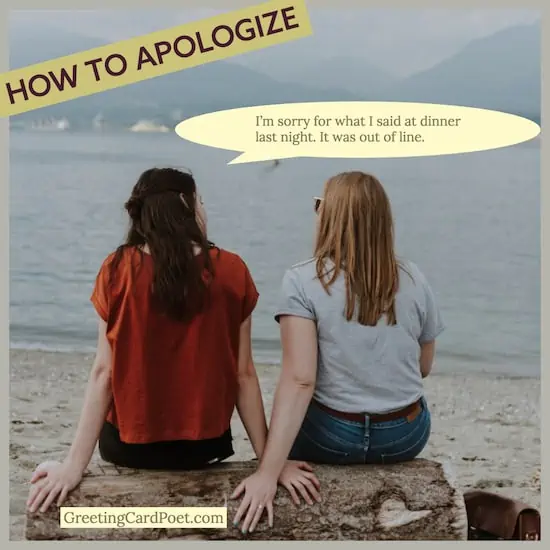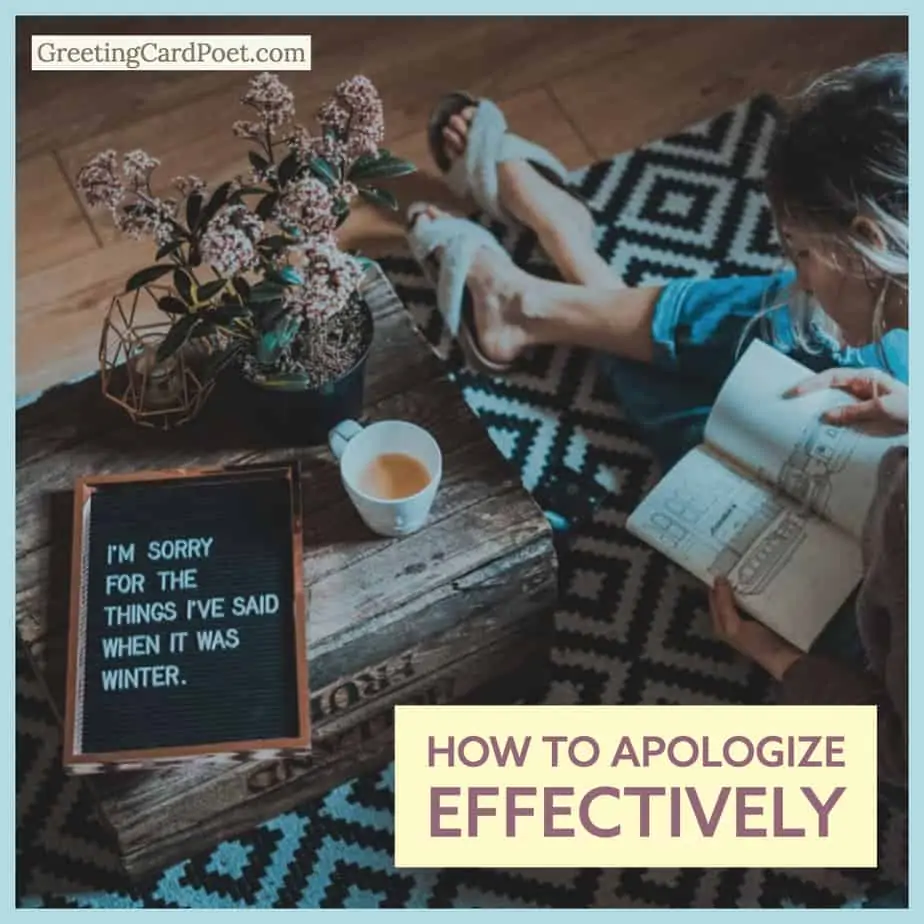How To Apologize Effectively
If everyone knew how to apologize and implemented the correct approach when needed, the world would be a better place. Inevitably, we all wrong some people in our lives.
At the time of realization, it’s appropriate to make an apology. But, please, don’t just stumble into it. Please give it some thought.
If a person feels they’ve been wronged or if they actually have been imposed upon, your words matter a lot. Your apology needs to be sincere and good-hearted. Please read through our definition of apology below, along with how to apologize, suggested messages, and how to accept an apology.
What’s an apology?
The word’s earliest meaning in English was “something said or written in defense or justification of what appears to others to be wrong. Ben Franklin quoted, “Never ruin an apology with an excuse.”
It can also be defined as a regretful acknowledgment of an offense or failure. It shows remorse over your actions and acknowledges the hurt that your actions caused to someone. Admission of error followed by an expression of regret. A written or spoken expression of one’s regret for having wronged another.

How to apologize: My apologies
1.) An apology keeps the focus on your actions. For example, “I’m sorry that you felt hurt by what I said at dinner last night.” Instead, try, “I’m sorry for what I said at dinner last night. It was mean and out of line.” Own your behavior and apologize, period.
2.) An apology requires that you try your hardest to avoid repeating the behavior that you apologized for. Put a sincere effort to ensure that there isn’t a repeat performance. For example, apologize for canceling plans last minute, then try to get together next time, and then cancel on them again. This is a repeat performance.
3.) An apology needs to be followed by corrective action. For example, if your friend says they paid for the last few lunches, apologize and tell your
friend, you will make it up to them and pay for the next few.
4.) An apology does not include the word “but.” The word “but” eliminates the apology and is almost always followed by an excuse or criticism.
For example, “I’m sorry, but I couldn’t get my homework finished because I had to bring my brother to the mall.” “I’m sorry, but the machine at work broke, so I couldn’t get my project completed.”
You might like the How to Start a Letter page.
How to apologize
1.) Ask for permission; When they permit you to apologize, let them know exactly what you are apologizing for.
2.) Make it right. Sometimes it isn’t possible to make the situation right. When it is possible, please do everything you can to make it right.
3.) Promise that you won’t do it again. If you do it again, what you offered is an excuse and not an apology for what you did.
4.) Forgiveness; After talking things through, don’t assume they forgive you. Ask them for your forgiveness.
5.) Handwritten note; This is a permanent reminder of your apology and your promise not to do it again. This will help keep your promise because they have your note saying you will.
6.) Intention; A sincere apology should be given and accepted with all intentions of restoring that relationship and making it stronger. Intention can move relationships to a deeper level of respect and care for one another.
7.) Express regret; This indicates to the hurt that you are aware that you caused them pain. Be responsible for owning up to what you said. Owning up to what you said or did will spell out what you did wrong.

Apology messages
1.) “I’m asking for your forgiveness. Will you please forgive me?”
2.) I’m sorry for hurting you. I wish I could turn back time and take back what I did.” “If I could take back time, I would change my behavior. Unfortunately, I can’t, so please let me make it up to you and accept my apology. I am so sorry.”
3.) “I’m sorry for what I said at dinner last night. It was cold and uncalled for.”
4.) “I apologize for being late to pick you up. I have no excuse. And I am sorry for keeping you waiting out in the cold.”
5.) I’m sorry my costume was offensive to you. It was never my intent to make you feel uncomfortable.”
6.) “Even though I probably don’t deserve it, I want to ask for your forgiveness.”
Saying I’m Sorry — How to Apologize
7.) “I overlooked your happiness to make myself happy. I realized that all of my happiness lies in your happiness. Please forgive me. I am sorry.”
8.) “This sad day is hurting me so much. I’m sorry. I take back my awful words. I know I am to blame. I’m sorry, my dear; please forgive me. I miss you so much.”
9.) “I’m sorry that I made you so sad today. Please give me another chance. My heart breaks every time we fight like this.”
10.) “Your heart means so much to me. I am sorry if I made you angry at dinner. I never want to hurt you like that again.”
Check out: Best I’m Sorry Messages.
How to say “apology accepted”
1.) Be direct. Tell them you are hurt and why. Allow them to make it right. For example, “I appreciate your apology, thank you. My feelings were really hurt when you yelled at me in front of our friends.”
2.) Have compassion. Have an open heart. It won’t replace their apology, but it will make it easier to hear.
3.) Be sincere. Sometimes a sincere “thank you” works best. For example, “I appreciate your apology, thank you.” “Thank you for apologizing, and I was really hurt when you told that lie about me.” “Thank you very much for your kind words in your letter. I appreciate you taking the time to write to me. It was great to hear from you. I forgive you.”
4.) Say, “I understand.” Use “I understand” rather than “it’s okay” or “it’s fine.” “I understand” makes them realize you accept that they are apologizing and move forward. “It’s okay” or “it’s fine” won’t make it clear to them that you accepted the apology and may come across as disrespectful.
5.) Forgive; “I accept your apology. In return, my forgiveness is my gift to you.” “I accept your apology and forgive you. Please know it will take time to earn your trust again.”
6.) Be mindful of your own feelings. “I am glad you said you are sorry. My feelings are still hurt. We need to talk about this more, knowing it will take time. I want to feel close to you again.”
Accepting an “I’m Sorry” Message
7.) Acknowledge specifically what they have said. “When you canceled our date, my feelings were hurt. I felt bad, and I hope you won’t do it again. Thank you for talking to me about it. I am feeling better since we spoke.”
8.) Listen. Let them speak without interruption. Try hard to really hear what they are saying. Respond, “I appreciate you coming to me. Your effort to acknowledge your mistake means a lot to me. I still need some time. Please understand.”
9.) Try to let it go. Give your friends breaks when you can. Please don’t dwell on it. “Thanks for the apology. I already rolled it off my shoulder.” “I appreciate your kind words; now, let’s move past this together.”
10.) Move on. “The letter of apology you sent shows me that you accept your mistake and that it was wrong of you to tell Mary about my crush on her. Thank you for being honest with me, and I hope our friendship continues for years to come.”
Moving On
After an apology has been communicated and accepted, it’s generally best for the relationship to move on. Connect with that person in the manner you did before the need for an apology. Good face-to-face communication can help.
Sometimes, the nuances of communication can be lost in our world of text messages, emails, and social media posts. When there’s a conflict, try to make every effort to communicate in person. If that’s not possible, pick up a phone. Two-way communication in real-time can solve a lot of problems.
Sometimes, we neglect to say “I’m sorry” to the people we love the most. Whereas many are quick to apologize to strangers or casual friends, we forget to make appropriate apologies to the ones in our families who are nearest and dearest. We don’t really buy into the Love Story movie message of, “Love means you never have to say you’re sorry.” On the contrary, you may have to apologize to the ones you love.
One other important note, don’t wait too long to make a good apology, and don’t take too long to accept an apology. Life is short. Say you’re sorry, accept the apology, and move on to bigger and better things. You’ll be glad you did.
By Sara Williams & Mike O’Halloran
Sara is a writer based in the Twin Cities, and Mike is the editor of Greeting Card Poet.
Extra Extra
You’re on the How To Apologize Effectively page.
You might like:
